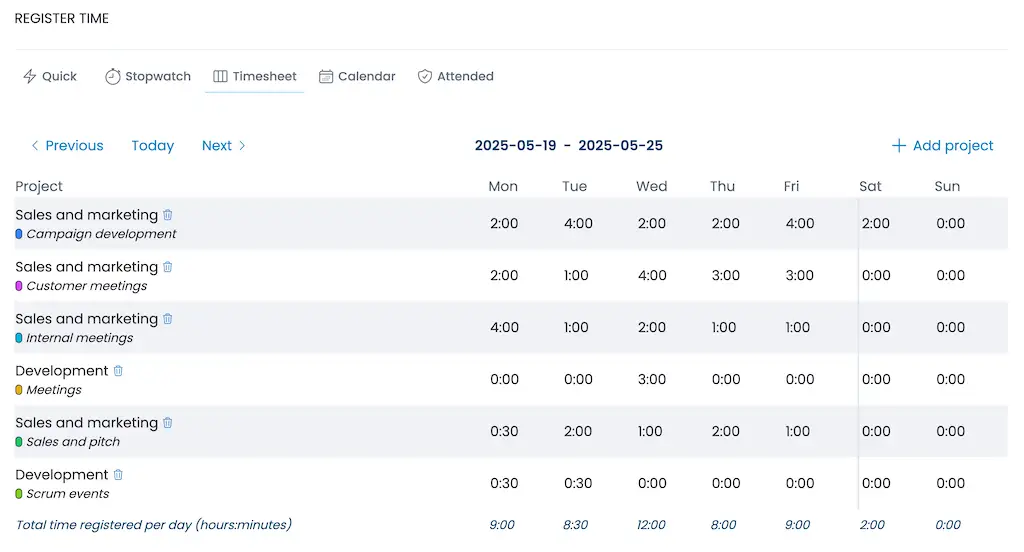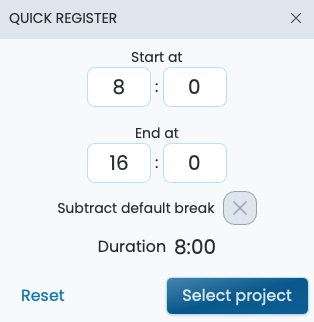Calendar to Timesheet: Different Ways to Track Your Time
Published {$created} by Carsten Blum
Not everyone works the same way — so why should time tracking be one-size-fits-all?For some, a calendar view makes the most sense. Others prefer the structure of a classic timesheet, while some just want a stopwatch or one-click option for quick logging. In this article, we’ll look at the different ways to track your time, their pros and cons, and who they’re best suited for. At the end, you’ll see how Nureti combines all of these methods into one tool — making easy time tracking accessible to freelancers, consultants, and small teams.
Want to jump straight in? Get started in under 5 minutes with our Quick Start Guide.
Calendar Time Tracking
What it is: A visual way to log hours by dragging and dropping blocks of time into a daily or weekly calendar.
Pros:
Highly visual and intuitive.
Great for planning the day or week ahead.
Easy to see overlaps and gaps.
Cons:
Can feel overwhelming if your schedule is very fragmented.
Works best when tasks are longer than 15–30 minutes.
Best for: Consultants, project managers, or freelancers who want an overview of their time distribution.

Timesheet Tracking
What it is: A classic spreadsheet-style table where you log hours worked per project or task, often daily or weekly.
Pros:
Simple and familiar for most people.
Ideal for generating invoices and client reports.
Perfect for companies used to traditional timesheets.
Cons:
Can feel repetitive if you don’t fill it in daily.
Lacks the visual overview of a calendar.
Best for: Teams and freelancers who need structured reporting for billing or compliance.

Stopwatch Time Tracking
What it is: Start and stop a digital timer while you work.
Pros:
Extremely precise — track time down to the second.
No need to estimate or round off hours.
Perfect for task-based work.
Cons:
Easy to forget to start or stop.
Can feel stressful if you constantly watch the clock.
Best for: Freelancers or developers working on short, clearly defined tasks.

One-Click or Quick Entry
What it is: Add a time entry with a single click or a fast manual input — ideal for logging small tasks.
Pros:
Super fast.
No need for detailed setup.
Great for capturing “micro-tasks” like calls or emails.
Cons:
Less detail than calendar or timesheet tracking.
Harder to use for client-facing reports.
Best for: Busy freelancers or consultants who want to log time on the go.

Which Method is Right for You?
The truth is, there’s no single “best” way. It depends on:
Your workflow (structured vs. flexible).
Your clients (need detailed reports vs. simple invoices).
Your team size (solo freelancer vs. multi-person team).
That’s why Nureti lets you switch between calendar, timesheet, stopwatch, and one-click views — so you’re never locked into one style.
Getting Started is Simple
No matter which method you prefer, the hardest part is just starting. With Nureti you can set up your account in minutes and test all four approaches to see which fits best. Read our Quick Start Guide to Easy Time Tracking and learn how to get going in less than 5 minutes.
Final Thoughts
Simple time tracking doesn’t mean basic — it means flexible. By giving you multiple ways to log hours, Nureti ensures you can:
Stay on budget.
Track billable and non-billable work.
Deliver accurate reports without extra effort.
The right method is the one that makes time tracking so easy, you’ll actually do it.